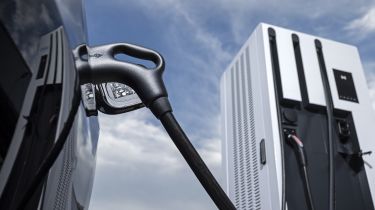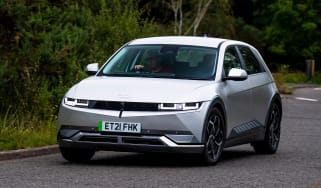Electric car particulate pollution myths busted by RAC report
A new report casts doubt on claims that EV tyres and brakes produce more particulates than those of petrol and diesel cars

Motoring organisation the RAC has commissioned an expert report from leading battery electrochemist Dr Euan McTurk to address what it calls ‘negative myths surrounding electric cars’, specifically those around non-exhaust emissions from brake and tyre wear.
The report addresses the quantities of toxic fine particulate matter (also known as PM 2.5s) generated from an electric car’s tyres and brakes, which are often said to be much worse than for an equivalent internal combustion-engined car. That’s because it’s commonly believed the extra weight of an EV’s battery increases the wear on these two items during normal driving.
Government Environment Secretary George Eustice recently spoke to MPs during a select committee session on the subject. “There is scepticism,” the cabinet minister said. “Some say that just wear and tear on the roads and the fact that these vehicles are heavier means that the gains may be less than some people hope, but it is slightly unknown at the moment.”
However, the RAC says Dr McTurk’s findings based on real-world use show that electric car brakes in fact wear much more slowly than those in conventional cars, because EVs rely so heavily on regenerative braking where the motor works in reverse to charge the battery, slowing the car without the brakes being applied.
Dr McTurk said: “Dundee Taxi Rentals says that brake pads on its 11 Nissan Leaf taxis have a lifespan of 80-100,000 miles – four times that of their diesel taxis. Discs tend to be changed due to warping rather than wear unlike on a conventionally fuelled vehicle, and last twice as long as those on diesel taxis.
“In addition, Cleevely EV, one of the best-known EV mechanics in the UK based in Cheltenham, regularly sees EVs with brakes that have lasted over 100,000 miles. The company says if they ever need to replace an EV’s brakes, it’s not because of wear but because they’ve seized up due to lack of use.”
Tyre wear may be less of an issue too, as the RAC says real-world experience shows EVs don’t get through tyres as rapidly some claim due to their weight. “Dundee Taxi Rentals reports that the lifespan of the front tyres on their all-electric front-wheel drive Nissan Leafs is about 5,000 to 10,000 miles less than their diesel taxis but, more positively, the rear tyres last the same amount of time, typically covering 30-36,000 miles before needing to replaced,” said Dr McTurk.
“Additionally, many tyre manufacturers are developing special tyres for electric vehicles, which provide greater efficiency and less wear without sacrificing grip. This includes big name tyre brands and new companies, like Enso, that have been set up specifically to tackle pollution from tyres.”
If you're looking to make the switch, check out our list of the best electric cars...
Find a car with the experts






